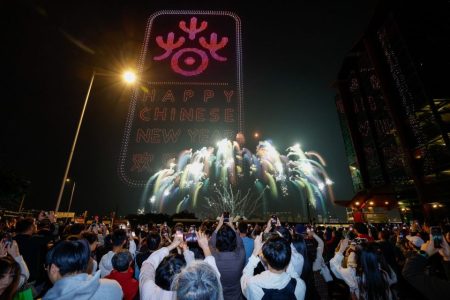Behind the glitz and the glamour, the Oscars – or the Academy Awards, to use the formal name – have been subjected to many criticisms, chief among them being their lack of racial diversity. This issue was prominently brought to the forefront in 2016 when the award’s 20 acting nominations featured only white performers for the second consecutive year.
What followed was a boycott of that year’s ceremony by prominent industry figures such as actress Jada Pinkett Smith and director Spike Lee. The whitewashing of nominees also led to a revival of the previous year’s #OscarsSoWhite social media movement, which drew further attention on the underrepresentation and racial bias at the Oscars and within the American film industry at large.
Asian performers have also been sidelined by the Academy Awards since they were first presented in 1929. According to the New York Times, only 23 out of the 1,808 Academy Awards acting nominees during the past 95 years have been performers of Asian descent.
[See more: Never mind the blockbusters: 8 alternative films to get excited about in 2024]
Clearly, much more needs to be done to increase the representation of Asians and other overlooked groups at the Academy Awards. Despite this, the history of the Oscars has not been all doom and gloom for Asian movies, as there have been major successes.
This year’s awards ceremony takes place on 10 March Eastern Standard Time (or the morning of 11 March here in Macao). It promises to be a grand, hours-long spectacle attracting millions of viewers who tune in to witness extravagantly dressed stars making movie history. As we count down, here’s a look at movies where the achievements and hard work of Asian actors and filmmakers were properly recognised.
Crouching Tiger, Hidden Dragon (2000)
Directed by acclaimed Taiwanese-American filmmaker Ang Lee, Crouching Tiger, Hidden Dragon (2000) is a martial arts fantasy epic that made history by becoming the first non-English language film to bag ten Oscar nominations, winning a total of four, including Best Foreign Language Film. It also holds the distinction of being the first, and currently only, foreign language film to gross over US$100 million at the US box office.
The film, set during the Qing dynasty, features balletic sword fights and flying warriors. Its multi-strand narrative primarily focuses on Li Mu Bai (Chow Yun-fat) and his friend Yu Shu Lien (Michelle Yeoh), as they attempt to recover the legendary sword, the Green Destiny, after it is stolen from them by a mysterious female warrior (Zhang Ziyi).
[See more: Six Studio Ghibli films you can’t miss (plus one bonus)]
Although more than two decades have passed since the film’s release, Lee said in a 2020 interview with CNA that “it was the toughest movie and the toughest part of my life.” Rather than simply focus on the fight choreography, which is what normally happens in martial arts films, the director noted that he became “too greedy” and wanted other aspects of the film, including its art design, acting and historic look to all be “good.”
In subsequent years, Lee would achieve further success at the Academy Awards by becoming the first person of Asian descent to win Best Director for Brokeback Mountain (2005). He followed this up with another Best Director win for Life of Pi (2012).
Spirited Away (2001)
Considered to be famed Japanese animator Hayao Miyazaki’s magnum opus, Spirited Away (2001) is currently the only non-English language and hand-drawn film to have won the Best Animated Feature prize at the Academy Awards.
The film follows the adventures of Chihiro, a 10-year-old girl who finds herself trapped in a fantastical world inhabited by folkloric creatures after a rest stop at an abandoned amusement park with her parents goes awry.
Much like Miyazakis’s previous films, Spirited Away features a strong female protagonist who finds herself transitioning from a naive young girl to a mature, self-confident and resourceful individual.
[See more: There are now two film festivals with near identical names in Macao]
Despite the film receiving an Oscar nod in 2003, Miyazaki refused to attend the ceremony in a protest against the US-led invasion of Iraq that year. Fast forward eleven years and the animation maestro would end up accepting an honorary Oscar for his significant contribution to the animation industry at the Academy’s Governors Awards.
True to his pacifist beliefs, Miyazki alluded to his anti-war sentiments during his acceptance speech, stating via an interpreter that a “fact of luck is that my country has not been at war for the 50 years that I have been making films.”
Slumdog Millionaire (2008)
The winner of eight Oscars, Slumdog Millionaire (2008) is not seen by some as an “Asian” film as it was written, financed and directed by the Western filmmaker Dany Boyle. However, this does not take away from the fact that India is at the heart of the film. Not only is Slumdog Millionaire based on an Indian novel, it was also shot on location in Mumbai with a cast of mainly Indian actors and crew members.
The film tells the story of Jamal Malik (Dev Patel), a young Indian man who recounts pivotal moments of his life to the police after they accuse him of cheating his way to the final question of the Indian version of Who Wants to Be a Millionaire?
[See more: Want to fund your Macao film? Apply now]
When it was released, the film was both commercially and critically successful, with film expert Roger Ebert hailing it as a film with “universal appeal” that presents “the real India to millions of moviegoers for the first time.”
However, Slumdog Millionaire polarised Indian society, with some high-profile figures such as actor Aamir Khan claiming that the film was not an accurate depiction of Mumbai, while others protested that it portrayed India in a negative light. Despite the criticisms, the film did help to bring greater attention to Bollywood and Indian creatives, including famed music composer, A.R. Rahman, who was awarded an Oscar for his score.
Parasite (2019)
Parasite (2019) made Oscar history when it became the first non-English feature to win Best Film, along with three other prizes including Best Director, Best Original Screenplay and Best International Feature Film, at the 92nd Academy Awards.
On the surface, the South Korean movie’s plot appears simple enough: the impoverished Kim family tricks the well-to-do Park family into hiring them as domestic workers in their household. However, as the story progresses, director Bong Joon-ho turns the narrative on its head, defying audience expectations at every step of the way and creating an allegory on the divide between the haves and haves-nots.
[See more: In conversation with Marco Müller: Fostering new talent at Macao’s film festival]
It is not difficult to see why Parasite was able to beat other heavyweight contenders that year, which included works from the likes of Quentin Tarantino, Martin Scorsese and Greta Gerwig. Bong’s genre bending film mixes satire, black comedy, drama, thriller and horror to create a package that is wholly original and impactful. The film is layered and makes heavy use of symbolisms such as the viewing stone, which represents the Kim’s desire for social mobility, and the Kim family’s odour, a symbol of their inescapable poverty.
By winning the Best Film, Parasite not only broke the glass ceiling for foreign language films, but it has also increased people’s awareness of such works. As Bong said during his acceptance speech for the Golden Globes, “Once you overcome the one-inch tall barrier of subtitles, you will be introduced to so many more amazing films.”
Minari (2020)
Based on the childhood experiences of director Lee Isaac Chung, Minari (2020) is a family drama that revolves around the struggles of a Korean immigrant, his wife and two children as they strive to realise the American Dream by moving from California to a farm in Arkansas. Complicating matters is the immigrant’s mother-in-law, played by Youn Yu-jung, who arrives from South Korea to assist with looking after the children.
Youn’s performance as the children’s unconventional grandmother who cusses and watches wrestling shows was very well-received, earning her an Oscar for Best Supporting Actress – making her only the second Asian actress to have ever done so. Steven Yeun, the male lead, also became the first Asian performer to be nominated for Best Actor, although he lost out to Anthony Hopkins.
[See more: A new film festival is coming to Macao next year]
Lee similarly failed to win an Oscar after being nominated for Best Director. Minari was nonetheless an extremely important movie to the filmmaker – born in the US to Korean parents – as it prevented him from quitting the industry altogether.
After failing to achieve the same level of success following his debut Munyurangabo (2007), Lee had considered shifting his entire focus to film teaching in Korea. Luckily, Minari was his last-ditch shot at success. Recalling the film’s successful premiere at Sundance 2020 in an interview with Screen Daily, Lee noted that “a year earlier, I had thought I was giving up filmmaking and was starting to talk with my boss in Korea about extending my teaching stay. So within one year to suddenly be at a festival and to be received in that way, it was as though my whole world was changing.”
Nomadland (2020)
Nomadland (2020) has a story that is as far from Asia as it can get. The film casts its lens on a widowed white American woman (played by Frances McDormand) who travels across the United States in her van for seasonal work, living life as a “nomad.”
However, the film was directed by Chloe Zhao, a Chinese-born auteur, who became the first Asian woman, and only the second woman, to bag the Best Director Oscar for her work on the film. Nomadland also won two other Academy Awards including Best Picture and Best Actress.
[See more: A guide to Chow Yun-fat and Tony Leung movie locations in Macao]
When Zhao went on stage to receive her Best Director statuette, she gave a heartfelt speech in which she briefly alluded to her Chinese heritage by reciting the first phrase of a Confucian poem: “People at birth are inherently good” (人之初性本善).
This segment of her speech not only referenced the nomads in her movie who are shown to care for each other in times of hardship, but it also threw a spotlight on Chinese culture. Ironically, her Oscar success was not celebrated in China because of comments she made several years before that were deemed critical of the country.
Drive My Car (2021)
Based on the eponymous short story by famed Japanese author Haruki Murakami, Japanese director Ryusuke Hamaguchi’s film Drive My Car is not a straightforward adaptation, even though it follows the same basic plot beats. Much like the short story, the movie is centred around a stage actor and director named Kafuku (Hidetoshi Nishijima) who must learn to come to terms with the death of his unfaithful wife (Reika Kirishima), while bonding with a young female chauffeur (Toko Miura), as he prepares for a production of the Chekhov play Uncle Vanya.
The cinematic adaptation of Drive My Car, however, greatly develops the characters and plotlines that were gleaned over or absent in the original text. For instance, the film expands on the relationship between Kafuku and his adulterous wife during the first forty-minutes. Hamaguchi’s film also incorporates elements of other Murakami short stories to create a work that successfully develops upon the original’s themes of grief, guilt and recovery.
[See more: Calling all local filmmakers]
The movie is also unique in the sense that while it is ostensibly a Japanese production, there are scenes featuring actors who use multiple languages, such as Korean Sign Language, Chinese and English, as the production of Uncle Vanya that Kafuku is directing is multilingual.
When merged together, these elements created a cinematic tour de force that was enthusiastically received by the international film festival circuit, garnering multiple accolades such as the Best Screenplay award at the Cannes Film Festival in 2021. The following year, the Academy awarded Drive My Car the Best International Feature Film.
Everything Everywhere All at Once (2022)
Directed by the US filmmaking duo of Daniel Kwan and Daniel Scheinert (known as “the Daniels”) Everything Everywhere All at Once was not treated as a serious contender for the Oscars when it was first released. Its mix of immigrant drama, science-fiction, comedy and martial arts was seen as tough sell to the Academy when compared to Oscar bait such as Tár and All Quiet on the Western Front.
Despite the initial scepticism, the movie began to pick up steam thanks to strong word of mouth and critical praise, which culminated in its snagging of seven statuettes, including Best Picture, Best Director and Best Actress at last year’s ceremony. The latter was presented to Malaysia’s Michelle Yeoh, who made history by becoming the first Asian woman to win the award.
[See more: Macao to host a new camp for emerging Asian filmmakers]
In the film, Yeoh portrays a middle-aged Chinese-American laundromat owner who finds herself dragged into defending the multiverse from a malicious being, all the while dealing with taxation and familial issues.
Although Everything Everywhere All at Once is an American production, it is still very much an Asia-centric affair, with clear cinematic influences from the Shaw Brothers, as well as Hong Kong directors such as Stephen Chow and Wong Kar-wai.






